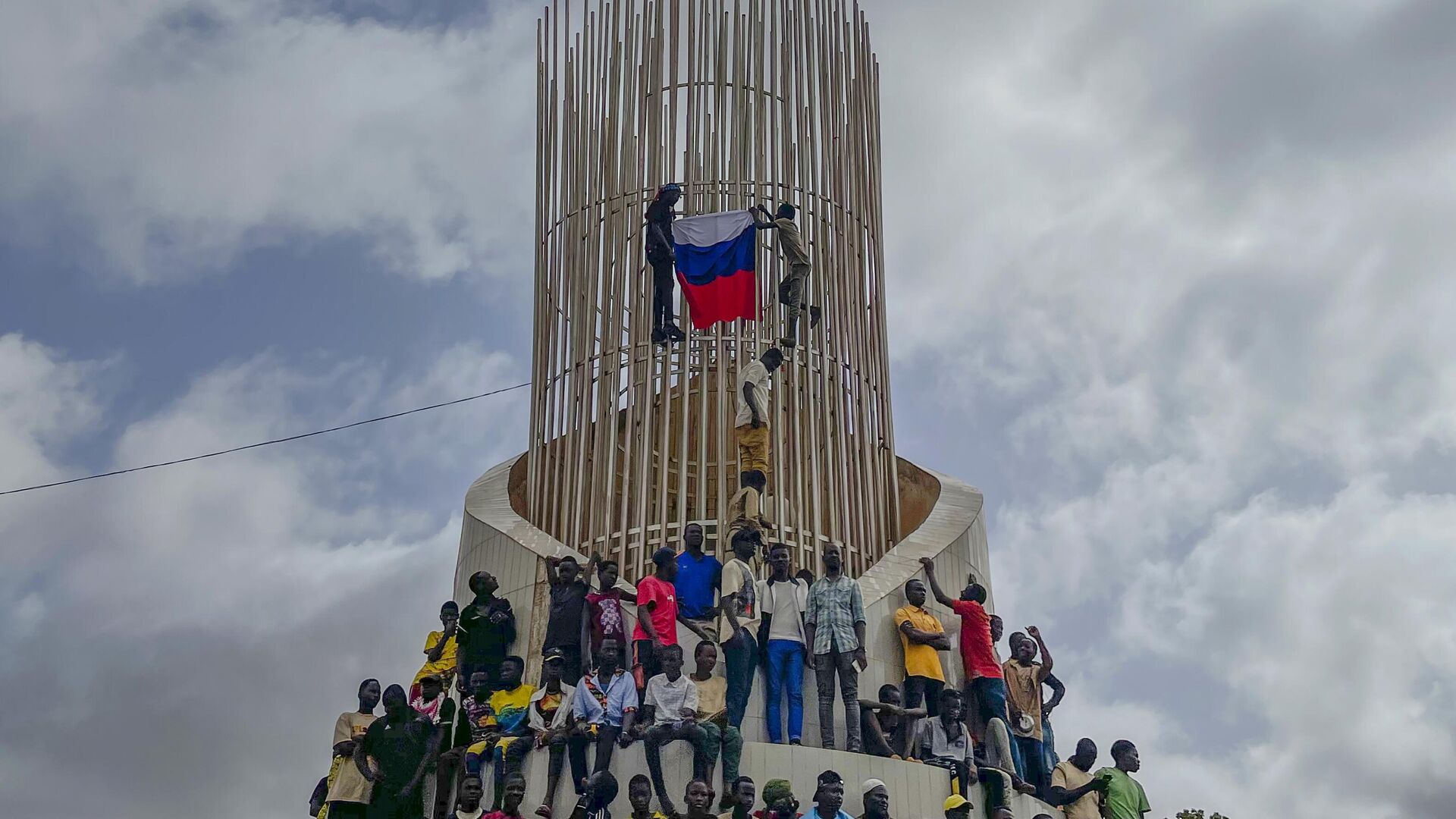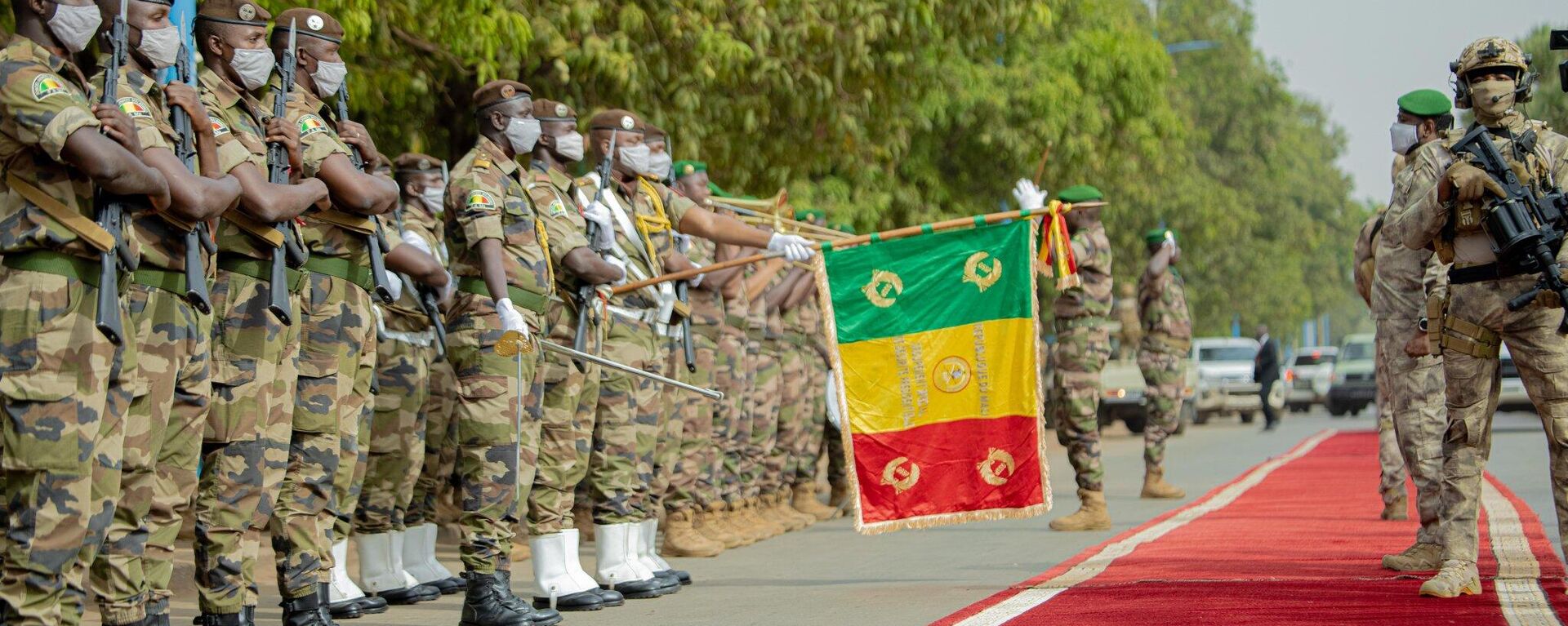https://en.sputniknews.africa/20240530/1066805774.html
West Only Keeps Things Status Quo in Sahel, While Russia Changes Situation for Better, Expert Says
West Only Keeps Things Status Quo in Sahel, While Russia Changes Situation for Better, Expert Says
Sputnik Africa
As the position of Western countries weakens in the Sahel region, especially in the military field, Russia’s cooperation with Niger, Mali and other countries... 30.05.2024, Sputnik Africa
2024-05-30T18:58+0200
2024-05-30T18:58+0200
2024-05-31T11:03+0200
opinion
africa insight
united states (us)
politics
france
niger
russia
sputnik africa
european union (eu)
military
https://cdn1.img.sputniknews.africa/img/07e7/09/02/1061801128_0:276:3150:2048_1920x0_80_0_0_0462465c252712ecb63132eea75dbd38.jpg
The influence of the United States and France is decreasing in the Sahel states and outside the region due to the fact that these Western countries only maintained the status quo in African countries and did not improve security, despite given promises, Vsevolod Sviridov, an expert from the center for African studies at the Higher School of Economics in Moscow, told Sputnik Africa.Russia, on the other hand, uses an "absolutely different approach" in its work with these African states, and it has already borne fruit: in Mali, with the help of Russian instructors and arms, the local troops "managed to gain foothold in the northern regions, which was almost declared impossible during French troops presence there," the expert highlighted.However, partnership with Russia is not limited solely to the military and security spheres. The expert also identified education as a priority area.Given the increasingly closer relationship between Moscow and Niamey, could the US impose punitive measures on Niger, considering that it has already introduced anti-Russian sanctions? Sviridov reckoned that it would depend on the dynamics of American-Nigerien relations.Coming back to the security topic, it is also important to discuss two issues: space security and the EU mission in Niger.Regarding the first one, one can recall that recently, a French media outlet reported that the US and French spy satellites were monitoring the Niger Republic's uranium mines. Thus, it's of "crucial importance" for Sahel countries to develop their own satellite systems, as "satellite information is a weapon by itself," said Sviridov.Such information can, of course, be used for good purposes, but it can also be used against some states, which will lead to "terrible" consequences.As for the second issue, according to Sviridov, this week's EU's decision not to extend its military mission in Niger has been "rather expected" after the departure of the US and French military; "it's no longer sufficient" for the EU to be in the country.But why, after years and years of Western military presence in Niger and Mali, the situation didn't turn out better? The reason behind it is brutally simple: the Western powers are just not interested in the continent's stability, as it would prevent the West from getting cheap mineral resources.Sviridov finished his interview with perhaps the most concise message Sputnik Africa has ever received, but nonetheless powerful and kind-hearted.
https://en.sputniknews.africa/20240521/eu-training-mission-in-mali-only-weakened-army-unlike-help-from-russia-malian-journo-says-1066672705.html
united states (us)
france
niger
russia
mali
sahel
europe
Sputnik Africa
feedback@sputniknews.com
+74956456601
MIA „Rossiya Segodnya“
2024
Christina Glazkova
https://cdn1.img.sputniknews.africa/img/07e7/0b/07/1063380906_0:0:673:674_100x100_80_0_0_79628b4d0cd9f29291a57aa13bbf9e7a.jpg
Christina Glazkova
https://cdn1.img.sputniknews.africa/img/07e7/0b/07/1063380906_0:0:673:674_100x100_80_0_0_79628b4d0cd9f29291a57aa13bbf9e7a.jpg
News
en_EN
Sputnik Africa
feedback@sputniknews.com
+74956456601
MIA „Rossiya Segodnya“
Sputnik Africa
feedback@sputniknews.com
+74956456601
MIA „Rossiya Segodnya“
Christina Glazkova
https://cdn1.img.sputniknews.africa/img/07e7/0b/07/1063380906_0:0:673:674_100x100_80_0_0_79628b4d0cd9f29291a57aa13bbf9e7a.jpg
africa insight, united states (us), politics, france, niger, russia, sputnik africa, european union (eu), military, mali, sahel, international, europe, russia-africa cooperation, education
africa insight, united states (us), politics, france, niger, russia, sputnik africa, european union (eu), military, mali, sahel, international, europe, russia-africa cooperation, education
West Only Keeps Things Status Quo in Sahel, While Russia Changes Situation for Better, Expert Says
18:58 30.05.2024 (Updated: 11:03 31.05.2024) Christina Glazkova
Writer / Editor
As the position of Western countries weakens in the Sahel region, especially in the military field, Russia’s cooperation with Niger, Mali and other countries is only growing stronger. Sputnik Africa tried to understand the reasons for what is happening in the region with a Russian Africanist.
The influence of the United States and
France is decreasing in the Sahel states and outside the region due to the fact that these Western countries only maintained the status quo in African countries and did not improve security, despite given promises,
Vsevolod Sviridov, an expert from the center for African studies at the Higher School of Economics in Moscow, told
Sputnik Africa."And I think the main issue here is that the model of cooperation that they proposed to African nations was inefficient for providing security to African countries. They did not provide any solutions for those crises that they faced. They only, to say it best, kept the situation as it was, kept it from rapid decline, kept it unstable, but not profitable for the African government," Sviridov said.
Russia, on the other hand, uses an "absolutely different approach" in its work with these African states, and it has already borne fruit: in Mali, with the help of
Russian instructors and arms, the local troops "managed to gain foothold in the northern regions, which was almost declared impossible during French troops presence there," the expert highlighted.
However, partnership with Russia is not limited solely to the military and security spheres. The expert also identified
education as a priority area.
"And also, I think that Niger is one of the areas where Russia may try to find some ways to cooperate with other regional influential players. Nigeria, for example, and Algeria have their interests in Niger, and they are close partners of Russia. And all these players are interested in stable and developing Niger, so this country may provide areas for beneficial partnerships for all parties [...]," Sviridov pondered.
Given the increasingly closer relationship between
Moscow and Niamey, could the US impose punitive measures on Niger, considering that it has already introduced anti-Russian sanctions? Sviridov reckoned that it would depend on the dynamics of American-Nigerien relations.
"We saw that in August, Victoria Nuland, one of the highest executives in the Department of State, visited Niger and tried to negotiate the conditions for the continuation of relations between Niger and the US. But as we see, after half a year, that did not bring any sufficient fruits for both parties. Niger intends to change its external partners and tends to find new partners in Moscow, in Beijing, in Tehran," he said.
Coming back to the security topic, it is also important to discuss two issues:
space security and the EU mission in Niger.
Regarding the first one, one can recall that recently, a French media outlet reported that the US and French spy satellites were monitoring the Niger Republic's
uranium mines. Thus, it's of
"crucial importance" for Sahel countries to develop their own satellite systems, as "satellite information is a weapon by itself," said Sviridov.
"Up to date, African countries do not have control over the information about themselves because a lot of the information they receive comes from Western sources, from Western satellites, and the data is being stored in Western data centers," he reminded.
Such information can, of course, be used for good purposes, but it can also be used against some states, which will lead to "terrible" consequences.
"If we have information, if African nations have their sovereign information, have their technical capabilities to interpret it to draw conclusions from that, that would, of course, improve the situation gradually, the expert said.
As for the second issue, according to Sviridov, this week's
EU's decision not to extend its military mission in Niger has been "rather expected" after the departure of the US and French military; "it's no longer sufficient" for the EU to be in the country.
"We see the results. The Nigerien population decided that this model of cooperation with the European powers was non-efficient, so they needed to leave. So, as we say, the facts are here," he added.
But why, after years and years of Western military presence in Niger and Mali, the situation didn't turn out better? The reason behind it is brutally simple:
the Western powers are just not interested in the continent's stability, as it would prevent the West from getting cheap
mineral resources."When the government is strong, when it controls its institutions, when it has strong regulators, strong agencies that control the actions of foreign investors, they try to take control over the activities of European business. And this means that the costs of resources coming from Africa are increasing, and the final cost of products being produced to import them to Europe is increasing too, undermining the economic efficiency of the European model," the speaker explained.
Sviridov finished his interview with perhaps the most concise message Sputnik Africa has ever received, but nonetheless powerful and kind-hearted.
"God bless Africa," he concluded.



